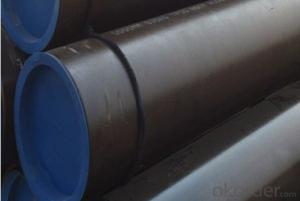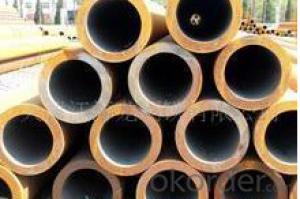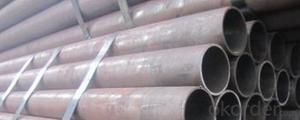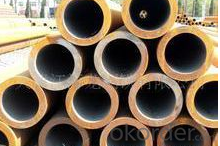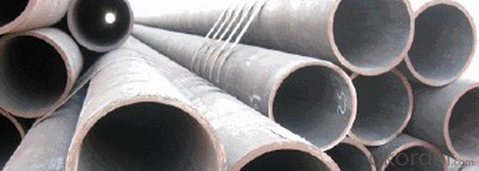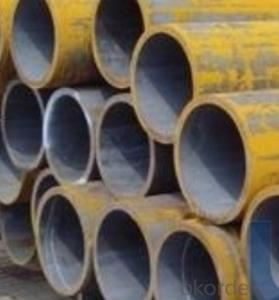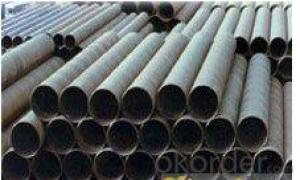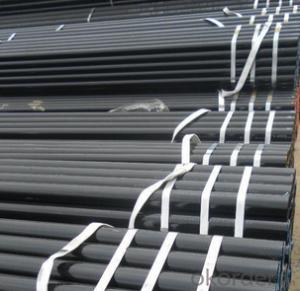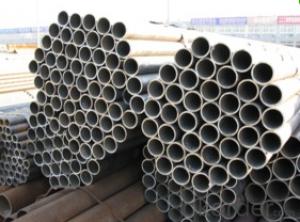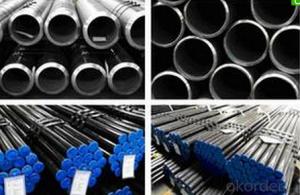Schedule 40 Seamless Carbon Steel Pipe Q345 CNBM
- Loading Port:
- Qingdao
- Payment Terms:
- TT OR LC
- Min Order Qty:
- 10 pc
- Supply Capability:
- 30 pc/month
OKorder Service Pledge
OKorder Financial Service
You Might Also Like
Quick Details
| Thickness: | 1.73 - 59.54 mm | Section Shape: | Round | Outer Diameter: | 10.3 - 914.4 mm |
| Secondary Or Not: | Non-secondary | Application: | Fluid Pipe | ||
| Technique: | Hot Rolled | Certification: | API | Surface Treatment: | Galvanized,vanish covering, black painting, galvenized ect. |
| Special Pipe: | API Pipe | Alloy Or Not: | Non-alloy | Length: | 5-12m as per customer's requirements |
| SCH: | SCH10~160, STD, XS & XXS | Payment Terms: | L/C T/T | Supply Ability: | 5000 Ton/Tons per Week |
| Product: | pipe prices | Grade: | 10#,20#,45#,A106(B,C),A53(A,B),12Cr1MoV,12Cr1MoVG,12Cr2Mo,13CrMo44,13CrMo45,15CrMo,15CrMoG,St52,St52.4,10#-45#,A53-A369,Cr-Mo alloy,ST35-ST52 | Standard: | API 5CT,API 5L,ASTM A106-2006,ASTM A53-2007,DIN 17175,GB 3087-1999,GB 5130,GB 6479-2000,GB 9948-2006,GB/T 17396-1998,GB/T 5312-1999,GB/T 8162-1999,GB/T 8163-1999,API,ASTM,DIN,GB |
Packaging & Delivery
| Packaging Detail: | By bundles, seaworthy wooden cases, steel framed cases, and simple packaging or according to the demand of the customers. |
| Delivery Detail: | within 5-15 days |
Specifications
1.pipe prices
2.Supply Ability:5000 Tons per Week
3.Payment Terms:L/C T/T
High quality Carbon steel pipe, Best pipe prices
1) Application: Overheat pipe for low and mediumpressure boiler,boiling water pipe, locomotive smoke pipe(big and small),Carry gas ,water or oil in the industries of petroleum and natural gas etc
2) Materials: 10#, 20#, 45#, 15CrMo, 12Cr1MoV, 13CrMo44, 12Cr2Mo, 13CrMo45, 12Cr1MoVG, 15CrMoG, API J55, API K55, API N80, API L80, API P110
3)Pipe according to standard: GB 3087-1999, GB/T 8163-1999, GB/T 8162-1999, GB 9948-2006, GB/T 17396-1998, GB/T 5312-1999, GB 6479-2000, GB 5130, DIN 17175, API 5CT, API 5L .
4)Packing: By bundles, seaworthy wooden cases, steel framed cases, and simple packaging or according to the demand of the customers.
Technical Parameters of Seamless Steel Pipe
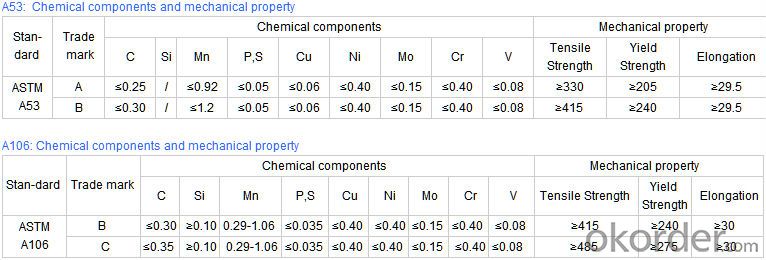
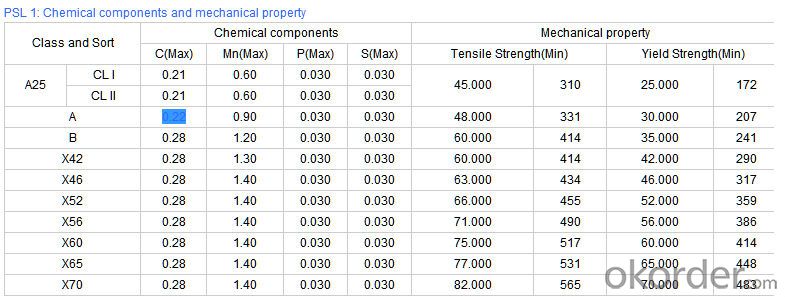
- Q: How do you calculate the pipe volume for steel pipes?
- In order to determine the volume of a steel pipe, one must possess knowledge regarding its length and the inner diameter. The formula for calculating the volume of a cylindrical shape, such as a pipe, is V = πr^2h, where V denotes the volume, π represents a mathematical constant which is approximately equivalent to 3.14159, r signifies the radius of the pipe (which is half of the inner diameter), and h stands for the length of the pipe. Initially, employ a measuring tape or a caliper to measure the inner diameter of the pipe. Proceed to divide this value by 2 in order to obtain the radius. Afterwards, proceed to measure the length of the pipe, utilizing inches, feet, or meters. Ensure that the same unit of measurement is used for both the radius and length. Once the measurements for the radius and length have been ascertained, input them into the formula V = πr^2h. For instance, let us assume that the inner diameter of the steel pipe measures 10 inches and the length amounts to 50 feet. Firstly, divide the inner diameter by 2 to determine the radius: 10 / 2 = 5 inches. Next, convert the length into inches: 50 feet * 12 inches/foot = 600 inches. Subsequently, input the values into the formula: V = 3.14159 * 5^2 * 600. By calculating the volume: V = 3.14159 * 25 * 600 = 47,123.85 cubic inches. Therefore, the volume of the steel pipe is approximately 47,123.85 cubic inches.
- Q: How are steel pipes used in building foundations?
- Steel pipes are often used in building foundations as piles or piers. They are driven into the ground to provide structural support and stability for the building. The steel pipes act as load-bearing elements, transferring the weight of the structure to the underlying soil or rock. Additionally, they can also be utilized for underground utility installations or as part of a drainage system in building foundations.
- Q: What are the different methods of coating steel pipes for insulation?
- There are several methods of coating steel pipes for insulation, each with its own advantages and disadvantages. 1. Thermal Insulation Coating: This method involves applying a layer of thermal insulation material, such as mineral wool or foam, onto the steel pipe. The insulation material helps to reduce heat transfer and minimize energy loss. Thermal insulation coatings are relatively easy to apply and can provide excellent insulation properties. However, they may be prone to degradation over time and may require regular maintenance and replacement. 2. Corrosion Protection Coating: Steel pipes are often coated with corrosion protection materials, such as epoxy or polyethylene, to prevent rust and corrosion. These coatings act as a barrier between the steel surface and the surrounding environment, protecting the pipe from moisture, chemicals, and other corrosive elements. Corrosion protection coatings are typically durable and long-lasting, providing effective protection for the steel pipe. However, they may not provide significant thermal insulation properties. 3. Fusion-Bonded Epoxy (FBE) Coating: FBE coating is a popular method for both insulation and corrosion protection. It involves applying a layer of epoxy powder to the steel pipe and then heating it to create a strong, durable bond. FBE coatings provide excellent adhesion and resistance to corrosion, as well as some thermal insulation properties. They are commonly used in oil and gas pipelines and can withstand high temperatures and harsh environments. 4. Polyurethane Foam Coating: Polyurethane foam is often used as an insulation coating for steel pipes. It is applied by spraying or injecting the foam onto the pipe surface, which then expands and hardens to create a protective layer. Polyurethane foam coatings provide excellent thermal insulation properties and can be applied to pipes of various sizes and shapes. However, they may require special equipment and expertise for application and may be susceptible to physical damage or moisture absorption if not properly sealed. 5. Ceramic Coating: Ceramic coatings are another option for insulating steel pipes. These coatings are typically applied using a thermal spray process, which creates a layer of ceramic material on the pipe surface. Ceramic coatings can provide high-temperature insulation, corrosion resistance, and thermal shock protection. They are commonly used in industries such as power generation and aerospace, where extreme temperature conditions are present. However, ceramic coatings can be expensive and may require specialized equipment and expertise for application.
- Q: What are the different sizes of steel pipes available?
- Steel pipes are available in a wide range of sizes, ranging from small diameters of around 0.5 inches to large diameters of up to 72 inches or more. The specific sizes of steel pipes vary depending on their intended use and application, with common sizes falling within the range of 1/8 inch to 36 inches in diameter.
- Q: How long are the seamless tubes? Are they six meters long?
- 6 meters of a root in general need to be customized, seamless tubes are mostly seven meters above the variable foot
- Q: How do steel pipes connect to other components?
- Steel pipes can connect to other components through various methods such as welding, threading, flanges, or mechanical couplings.
- Q: How do steel pipes handle high-velocity flow?
- Steel pipes are designed to handle high-velocity flow efficiently due to their inherent strength and durability. The smooth interior surface of steel pipes minimizes friction, allowing for smooth flow and reducing energy loss. Additionally, the sturdy construction of steel pipes enables them to withstand the pressures and forces exerted by high-velocity flow without deformation or failure.
- Q: How do steel pipes handle abrasive materials?
- Steel pipes are highly resistant to abrasive materials due to their strong and durable nature. The smooth interior surface of steel pipes minimizes friction and wear caused by abrasive materials, making them an ideal choice for handling such substances.
- Q: What are the advantages of using steel pipes in the manufacturing of furniture?
- There are several advantages of using steel pipes in the manufacturing of furniture. Firstly, steel pipes offer exceptional strength and durability, ensuring that the furniture will be long-lasting and capable of withstanding heavy use. Secondly, steel pipes are highly resistant to corrosion, making them suitable for both indoor and outdoor furniture. Additionally, steel pipes provide a sleek and modern aesthetic, adding a touch of sophistication to the furniture design. Lastly, steel pipes are relatively lightweight compared to other materials like wood or concrete, making transportation and installation easier. Overall, using steel pipes in furniture manufacturing offers a combination of strength, durability, aesthetic appeal, and practicality.
- Q: Can steel pipes be used for the construction of dams?
- Yes, steel pipes can be used for the construction of dams. Steel pipes are strong, durable, and have a high load-bearing capacity, making them suitable for various applications in dam construction, such as for penstocks, spillways, and drainage systems. They can withstand the pressure and weight exerted by water and are resistant to corrosion, which is crucial for the long-term stability and integrity of dams. Additionally, steel pipes can be easily fabricated and installed, making them a practical choice for dam construction projects.
Send your message to us
Schedule 40 Seamless Carbon Steel Pipe Q345 CNBM
- Loading Port:
- Qingdao
- Payment Terms:
- TT OR LC
- Min Order Qty:
- 10 pc
- Supply Capability:
- 30 pc/month
OKorder Service Pledge
OKorder Financial Service
Similar products
Hot products
Hot Searches
Related keywords
